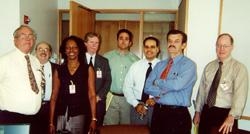
Some of the Finance Department staff who worked in temporary space in the Whitney Pavilion Research Laboratories while their offices at 100 Broadway, near "ground zero," remained closed: (from left) Kevin McGrath, Richard Weisenmuller, Marie Thompson, Edward Walsh, Lorenzo Loerio, Aureo Pinto, Steve Borhi and Pat Kane.
Immediately following the terrorist destruction of the World Trade Center on Sept. 11, our Hospital and Medical College went into action to implement our Disaster Plan with one goal in mind: to do everything in our power to save as many lives as possible and help the disaster victims who needed our care.
It was with bitter disappointment in the days following that we and the entire city learned that the number of injured survivors would be very small compared to the thousands of people who did not make it out of the World Trade Center towers. It appears that these victims died on the spot when the buildings collapsed. Tragically, three of the victims were members of the paramedic service at this Medical Center. They were among hundreds of dedicated firefighters, police and emergency medical personnel who risked their lives to save the lives of others.
Our Burn Center, one of the largest and most advanced in the world, received 25 patients with the most severe burn and inhalation injuries; 21 remain in critical condition; four have died.
Despite our disappointment in not being able to help more of the victims of the disaster, the faculty, staff and students at Weill Cornell should take pride in the way they responded to the emergency. Everyone wanted to be able to do something to help, and everyone wanted to do more. But, unfortunately, there just wasn't any more that could be done in a situation like this.
Just three and a half blocks from "ground zero" at the World Trade Center, more than 80 Weill Cornell employees work in our off-campus Business and Finance office at 100 Broadway. Fortunately, all of our employees who were in the Broadway building at the time of the collapse of the World Trade Center tower evacuated safely with few injuries. But like many fleeing the area, they were covered with the dust and soot of the fallout after the collapse of the buildings.
Many people, including many of us at Weill Cornell, must cope with the personal loss of family, friends and others whom we knew have died or are among the "missing." Our hearts go out to everyone who has experienced such a loss.
At times like this, many people draw strength from their religious faith, as we have seen with the many prayer services and vigils that have been held in the city and throughout the nation. For many, religious faith is what sustains them and enables them to cope with disasters like this.
Because this was a terrorist act of unimaginable proportions, people will continue to have feelings of insecurity and anxiety, not knowing whether the danger is over or whether the "end" is in sight. People will continue to be concerned about themselves, about their families, about the future. To help employees and others cope with these feelings, the Medical Center offers a number of counseling services provided by specially trained personnel.
People near the site of the disaster have seen horrific things that most of us never expect or want to see, things we are probably not prepared to handle emotionally. After a traumatic event such as this, emotional or psychological reactions may not appear immediately, but may develop a week or so after the event. If emotional or psychological distress persists over a longer period of time, affected individuals should seek professional assistance.
Weill Cornell students made many contributions to the response to the emergency. On Tuesday night, Sept. 11, a group of students volunteered as clerical workers in the emergency room. Other students collected donations of supplies for relief of rescue workers at the disaster site.
In another kind of unfortunate aftermath to the tragedy, second-year medical students rallied around fellow students and two of their friends who are members of the Sikh faith, after these friends experienced some of the anger that a minority of New Yorkers and others in the U.S. have turned on anyone who "looks" as if they might be Muslim or Arab. These second-year students held a prayer vigil with their Sikh friends in one of our student residence halls.
A practical difficulty that the Medical College experienced, but minor in comparison to the real tragedies of the last two weeks, involved the payrolls for employees that are normally processed in our Finance Department at 100 Broadway. When this building was evacuated on Sept. 11, the computer payroll tapes had not been prepared for our payroll due on Friday, Sept. 14. But our indomitable Finance Department staff rose to the occasion again and arranged with Chase Bank to make deposits to employees' direct-deposit accounts in amounts equal to the previous payroll distribution. The Medical College has about 3,500 employees, and all but about 700 are paid by direct deposit. Only 125 employees who do not have direct deposit needed payroll cash advances, which we were able to provide. We expect that our Finance Department staff will be able to reoccupy their offices at 100 Broadway sometime this week.
For all of us in the Weill Cornell community, getting back to "normal" will be a difficult process after the events that we have experienced. But we have shown our resilience in the face of tremendous adversity and our dedication to our mission of service.
On behalf of the Medical College and Cornell University, I want to thank all of our faculty, staff and students for their dedicated efforts in this crisis for our city and our nation.
—Antonio M. Gotto Jr., M.D., Dean, Weill Cornell Medical College, and Provost for Medical Affairs, Cornell University

